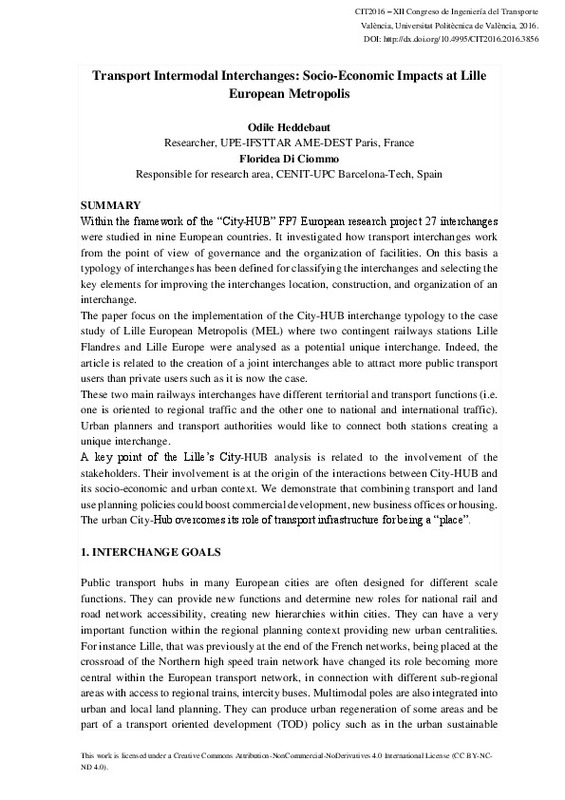JavaScript is disabled for your browser. Some features of this site may not work without it.
Buscar en RiuNet
Listar
Mi cuenta
Estadísticas
Ayuda RiuNet
Admin. UPV
TRANSPORT INTERMODAL INTERCHANGES: SOCIO-ECONOMIC IMPACTS AT LILLE EUROPEAN METROPOLIS
Mostrar el registro sencillo del ítem
Ficheros en el ítem
| dc.contributor.author | HEDDEBAUT, Odile
|
es_ES |
| dc.contributor.author | Di Ciommo, Floridea
|
es_ES |
| dc.date.accessioned | 2017-11-02T10:16:28Z | |
| dc.date.available | 2017-11-02T10:16:28Z | |
| dc.date.issued | 2016-06-01 | |
| dc.identifier.isbn | 9788460899600 | |
| dc.identifier.uri | http://hdl.handle.net/10251/90334 | |
| dc.description.abstract | [EN] Within the framework of the “City-HUB” FP7 European research project 27 interchanges were studied in nine European countries. It investigated how transport interchanges work from the point of view of governance and the organization of facilities. On this basis a typology of interchanges has been defined for classifying the interchanges and selecting the key elements for improving the interchanges location, construction, and organization of an interchange. The paper focus on the implementation of the City-HUB interchange typology to the case study of Lille European Metropolis (MEL) where two contingent railways stations Lille Flandres and Lille Europe were analysed as a potential unique interchange. Indeed, the article is related to the creation of a joint interchanges able to attract more public transport users than private users such as it is now the case. These two main railways interchanges have different territorial and transport functions (i.e. one is oriented to regional traffic and the other one to national and international traffic). Urban planners and transport authorities would like to connect both stations creating a unique interchange. A key point of the Lille’s City-HUB analysis is related to the involvement of the stakeholders. Their involvement is at the origin of the interactions between City-HUB and its socio-economic and urban context. We demonstrate that combining transport and land use planning policies could boost commercial development, new business offices or housing. The urban City-Hub overcomes its role of transport infrastructure for being a “place”. | es_ES |
| dc.format.extent | 12 | es_ES |
| dc.language | Inglés | es_ES |
| dc.publisher | Editorial Universitat Politècnica de València | es_ES |
| dc.relation.ispartof | XII Congreso de ingeniería del transporte. 7, 8 y 9 de Junio, Valencia (España) | es_ES |
| dc.rights | Reconocimiento - No comercial - Sin obra derivada (by-nc-nd) | es_ES |
| dc.subject | Interchanges | es_ES |
| dc.subject | City-Hub | es_ES |
| dc.subject | Socio-econimic Impacts | es_ES |
| dc.subject | Lille transport nodes | es_ES |
| dc.title | TRANSPORT INTERMODAL INTERCHANGES: SOCIO-ECONOMIC IMPACTS AT LILLE EUROPEAN METROPOLIS | es_ES |
| dc.type | Capítulo de libro | es_ES |
| dc.type | Comunicación en congreso | es_ES |
| dc.identifier.doi | 10.4995/CIT2016.2015.3856 | |
| dc.rights.accessRights | Abierto | es_ES |
| dc.description.bibliographicCitation | Heddebaut, O.; Di Ciommo, F. (2016). TRANSPORT INTERMODAL INTERCHANGES: SOCIO-ECONOMIC IMPACTS AT LILLE EUROPEAN METROPOLIS. En XII Congreso de ingeniería del transporte. 7, 8 y 9 de Junio, Valencia (España). Editorial Universitat Politècnica de València. 2210-2221. https://doi.org/10.4995/CIT2016.2015.3856 | es_ES |
| dc.description.accrualMethod | OCS | es_ES |
| dc.relation.conferencename | CIT2016. Congreso de Ingeniería del Transporte | es_ES |
| dc.relation.conferencedate | June 07-09,2016 | es_ES |
| dc.relation.conferenceplace | Valencia, Spain | es_ES |
| dc.relation.publisherversion | http://ocs.editorial.upv.es/index.php/CIT/CIT2016/paper/view/3856 | es_ES |
| dc.description.upvformatpinicio | 2210 | es_ES |
| dc.description.upvformatpfin | 2221 | es_ES |
| dc.type.version | info:eu-repo/semantics/publishedVersion | es_ES |
| dc.relation.pasarela | OCS\3856 | es_ES |








